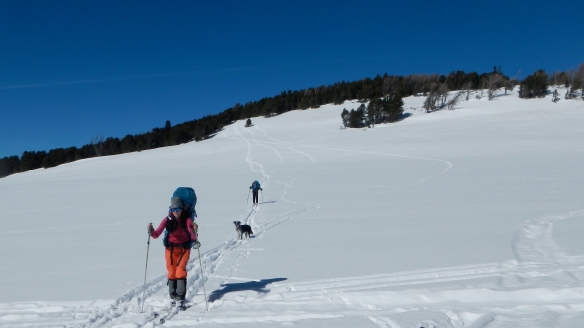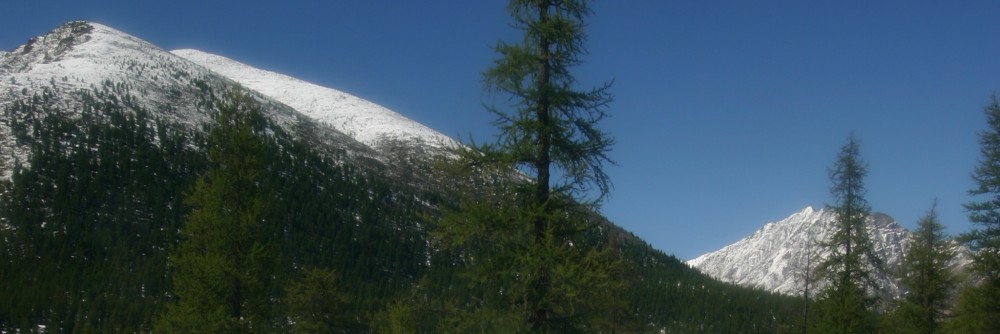On Friday, the Mongolia ski expedition team set out for a shakedown – a trial run to test equipment, fitness, and group dynamics. It’s the first time all of us have been together since we started planning this trip more than a year ago; I spent the summer in Mongolia, and team member Forrest McCarthy has been in Antarctica all winter. Expedition organizer Gregg Treinish, of Adventurers and Scientists for Conservation, and I are both based in Bozeman, and Jason Wilmot, who is based in Jackson, has been through town a couple of times, but we’d never all been in the backcountry, or even in a room, together. So when we convened in the midst of a snow squall in a parking lot at the Taylor Fork off of Gallatin Canyon, with a carload of brand new gear and a whole lot of expectations, I was nervous and excited. In less than three weeks, we’ll be setting out on a 350-400 mile loop of the mountains around the Darhad Valley in northern Mongolia. This was our opportunity to figure out how we function as a pack.
Two straightforward admissions: I like wolverines because they reflect an independence of character that I think I possess. I’m not a creature of hierarchies or groups, I’m incapable of engaging in competition or dominance games (I just zone out or leave situations in which these things are important), and I know that working well with others is not always one of my strong points. And also, I have been worried all winter about being the only woman – and a small, lightweight woman who hasn’t been winter camping in 12 years – among a group of incredibly fit, strong men who are backcountry experts. It’s one thing to carry a 50 pound pack when it’s 25 or 30 percent of your body weight; it’s another thing altogether to carry it when it’s 50 percent of your body weight. All winter I’ve been hauling bait and camera station supplies around the mountains, hoping that this would render me tough enough, but no matter how frequently I go out, I still end up exhausted after a few hundred yards of hauling a burden uphill through thigh deep powder. I consistently felt like a failure. The complex dynamics of working in Mongolia also weighed on my mind. I’ve set out to traipse through the mountains of Mongolia alone or with a few good friends, for work or for fun, dozens of times over the past 13 years, but I’ve never felt so responsible for the experience of people who, at least in the case of Gregg and Forrest, I don’t know that well, and who have absolutely no experience working in Mongolia or on long-term, community-based international conservation and research projects. So as we divided up the new gear and packed it into our bags, I was on the verge of hyperventilating. What if I couldn’t keep up? What if I wimped out in the cold? Worse yet, what if we all simply hated each other?
Gregg’s girlfriend was also along for the weekend, and she, Jason, and Forrest had all brought their dogs, so we were a big group as we embarked. We left a car at Taylor Fork and then drove north to set out from Big Sky. Our route would take us over approximately 25 miles of mountain terrain, over the course of two days. As we wound our way up into the mountains on the first evening, we left the well worn trail and pushed further up towards the passes that would lead us back to the Taylor Fork drainage. The pack didn’t feel anywhere near as heavy as I’d feared, although I was still behind – until we left the trail and set out over crusty, unconsolidated snow. The guys, along with our three canine companions, began to punch through the crust. I stayed on top and pushed ahead. Forrest, veteran of a zillion expeditions and instant source of calm confidence for anxious novices, neatly summed it up by pointing out that what might seem like a weakness can, in certain circumstances, turn into a strength. This is how wolverines take down moose and reindeer. My trepidation diminished.
We spent a spectacularly starry night testing our tents and bags, which were surprisingly comfortable and warm. The next day we headed up towards the first pass. The sky was clear, Lone Peak arced up into the blue with breathtaking grace, and it was pure exhilaration to be out, with mountain peaks on the horizon in all directions. With the guys still punching through the crust and with me lagging on the uphills, though, we were concerned that we might have to turn around, but Gregg encouraged us to push on towards our original goal. It was a long day, with multiple tumbles on my part down steep slopes as I adjusted to the new skis. Jason and Forrest are both amazing to watch on skis, fearless and elegant, with their dogs bounding just ahead or behind. I am a lot less graceful, and it took some time to get used to the kicker skins and the weight and balance of the new pack. We arrived at our campsite after dark, mostly because I’d been so slow on the uphills. Halfway through the day I’d started to run a strange fever, concentrated in my ear lobes and the lymph nodes of my neck, and had become unbearably dehydrated. I felt pretty awful by the time I crawled into my sleeping bag, though I hoped this was all just an adjustment and part of the learning process. My sister, who is a marathoner, has been a source of confidence and inspiration as I’ve prepared for this trip, and I fell asleep thinking of her advice about the mental and physical fortitude that it takes to complete these big endeavors: once you survive it once, you know you can do it again. I’d made it through day one. Everything after this was just another day.

Skiing from Big Sky to the Taylor Fork, testing gear, skills, and the fortitude of Montana’s amazing dogs. Photo by Forrest McCarthy.
Sure enough, the next day was easier, with the exception of an absolutely terrifying, steep, icy slope that I felt like cursing with eternal damnation. But the clear skies, the great skiing through rolling meadows below, the abundant tracks of ermine, marten, snowshoe hare, and squirrels gamboling through the forest, and the mountain views more than compensated for the moments of doubt up on the steep pitch. Gregg’s encouragement to press on towards the Taylor Fork, Forrest’s consistent confidence, and Jason’s absolute competence in all things related to being out in the mountains, were reassuring, and all paid off. I’ve been out on research trips with guys who have constantly put me (and other female companions) down for lack of experience or strength, and this is my number one test of any men with whom I hike – do they try to make me feel bad? Do I, in turn, find myself wishing that one or more of them might conveniently fall off the nearest cliff? Despite very disparate personalities in the everyday civilized world, we functioned pretty well as a group in the backcountry. I still feel like the weak link, but as Jason pointed out, as the only person who speaks Mongolian and has connections in country, I will be the critical piece once we’re in Mongolia. So we all have our roles to play, and like any wolf pack, each member helps the whole to function.
By the time I got home, my face, hands, arms, and chest had broken out in hives and I was running a serious fever. My ears were so hot that they felt like they might combust, my lymph nodes were hard as rocks, my fingers were swollen and painful, and I had huge welts across my face. This morning, I went to the doctor, who said it was probably just a bad reaction to the sun. Later in the day I saw my Mongolian friend Badmaa, who is here in Montana on a Fulbright scholarship. She said that the condition looked to her like something that Mongolians refer to as huiten alergiin, an allergy to cold – she described the symptoms right down to the burning ears. And then she added that the other name for it, in Mongolian, is chonii hurgan, or “rough wolf skin” – a suitable initiation for a temporary transformation into a creature of the pack.

Sounds like it went pretty well, even including the fever/allergy! Hope you get well soon and figure that out though! (Magadgui sarmis idej heregtei yum uu?)
Sarmis idsen! Bi yag adilhan bodson.
🙂